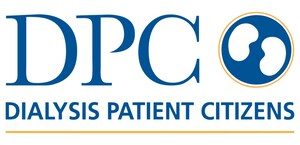WASHINGTON, June 22, 2020 /PRNewswire/ -- Today, Dialysis Patient Citizens (DPC) filed suit in the United States District Court for the District of Columbia against Health and Human Services Secretary Alex Azar, Centers for Medicare and Medicaid Services Administrator Seema Verma, the U.S. Department of Health and Human Services, and the Centers for Medicare and Medicaid Services in opposition to a discriminatory new federal regulation that will limit the ability of hundreds of thousands of End-Stage Renal Disease (ESRD) patients to access affordable, high quality treatment.
"ESRD patients successfully fought to get Congress to pass bipartisan legislation that would ensure they could enroll in Medicare Advantage in order to receive access to high-quality coordinated care at a more affordable cost currently available to everyone else. By issuing this rule, Secretary Azar and Administrator Verma circumvented Congressional intent and effectively invalidated that law with this new regulation," said Hrant Jamgochian, Chief Executive Officer of Dialysis Patient Citizens. "Unfortunately, the Secretary and Administrator ignored the fact that many ESRD patients must receive dialysis three times a week and that access to dialysis facilities within a reasonable distance is a matter of life and death. By ending time and distance limit requirements in Medicare Advantage, this regulation will limit patient choice and give ESRD patients no option but to remain in the fee-for-service program that can cost more out of pocket and offers spotty care coordination services. These are not acceptable outcomes so we are taking legal action to correct this decision."
Specifically, the new CMS regulation singles out ESRD patients and unravels their longstanding protection by eliminating time and distance limits for dialysis facilities from network adequacy requirements for Medicare Advantage plans, which could prevent hundreds of thousands of ESRD patients from receiving access to affordable treatment through Medicare Advantage as Congress intended. The result will be a smaller number of dialysis clinics included in Medicare Advantage networks across the country, meaning many ESRD patients will no longer be within driving distance of the lifesaving care they depend on.
CMS has replaced the time and distance limits with another standard that is usually applied for services which patients don't regularly travel to receive, unlike dialysis treatments.
DPC is represented in the lawsuit by Lynn E. Calkins and Cynthia A. Gierhart of Holland & Knight LLP and by Jay Angoff of Mehri & Skalet, PLLC. A copy of the complaint may be found here.
Media Contact:
Hannah Bracamonte
[email protected]
SOURCE Dialysis Patient Citizens

Related Links
WANT YOUR COMPANY'S NEWS FEATURED ON PRNEWSWIRE.COM?
Newsrooms &
Influencers
Digital Media
Outlets
Journalists
Opted In





Share this article